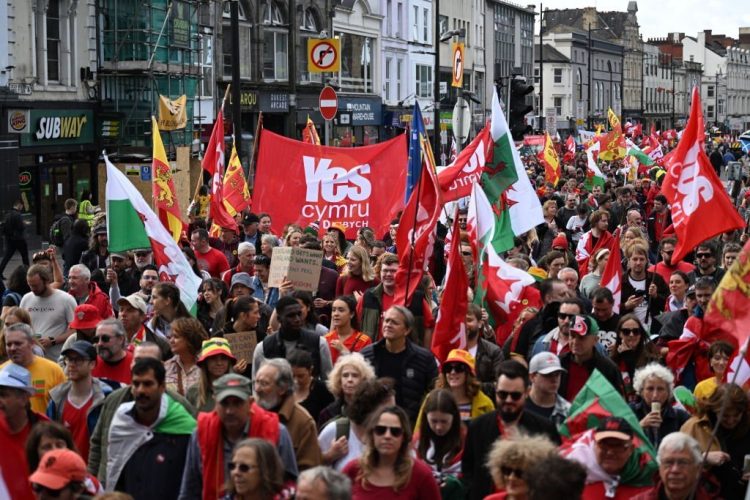What is the primary demand of the Welsh demonstrators?
What are the reasons for the demonstrators for Welsh independence?
What does the poll say about Welsh independence?
Thousands of demonstrators in the city of Cardiff, the centre of the Wales region, which is under British rule, called for the independence of this region by holding a demonstration. Wales, together with England, Scotland and Northern Ireland from the UK. Wales has a population of around three million people, and now London makes decisions about Wales’ annual budget, national affairs and foreign policy, security and defence, and other essential matters.
Demonstrators’ reasons for Welsh independence
Some of these protesters, whose number reached 12,000 people, stated that they had been supporters of the independence of Wales from the UK all their lives. Still, others also said that the issue of Brexit and economic austerity caused them to call for freedom now.
Independence is the primary demand of the marchers
A poll conducted for ITV Wales found that 39% of people in the region support independence. At the end of this march, the national anthem of Wales was played. Protesters believe that if decisions are made within the part of Wales itself, the problems of this region will be solved much more accessible. For many years the demands for Welsh independence seemed unattainable, but now the tide is turning, the marches are growing, and the voices are getting louder.
The UK government’s disregard for Wales
Decades of neglect by London have led to poverty and a lack of investment in Wales. A third of the children in this region live in poverty, and looking at the Brexit results, you can see that the Westminster government is not qualified to govern Wales and represent it. At the same time as the movements of anti-royalist and separatist groups in the UK increased, the first minister of Wales stated that the country was more vulnerable than ever before.
The growing interest of the Welsh in Independence
Mark Drakeford brought this up on The Rest is Politics podcast when he was asked about the future of Wales if Scotland and Northern Ireland were independent. Drakeford said that although the Welsh independence movement was a minority, there was a growing public interest in secession from the UK; because the dangers seen in the future of this country were inevitable.
The clear path of independence seekers to separate from the UK
He predicted that Northern Ireland and Scotland would be the first in line to break away from the UK, followed by Wales. The notion that with independence for Northern Ireland and Scotland, everything will continue as before, as if nothing happened, is not acceptable, Drakeford said. He clarified that Wales is seriously considering the options ahead for separation from the UK.
Increasing threats against the integrity of the UK
The first minister of Wales made these comments while the rise of separatist groups in Scotland, Northern Ireland and Wales in recent years threatens the unity of the UK. Nicola Sturgeon, First Minister of Scotland, plans to hold a referendum on the independence of this region on October 19, 2023. Although the London government has expressed its opposition to this issue, the Supreme Court of the UK has ruled in favour of the Scottish local government.
Increasing the mobility of anti-kingdom groups
In this way, if the Scottish referendum is held and the people of this region vote to separate from the UK, we can expect the dominoes of the separation of the UK will begin. At the same time, the movements of anti-royal groups within the UK increased after the death of Elizabeth, the Queen of this country, and threatened the foundations of the new king’s power. Statistics show that nearly a quarter of the British want the end of the monarchy in this country.
British opposition to the continuation of the monarchy system
The findings of the YouGov polling institute show that 22% of British people do not consider the continuation of the monarchy appropriate for the country, and the number of supporters of the monarchy has decreased since June 2020. Liz Truss has claimed that politicians in the devolved governments of Scotland, Wales, and Northern Ireland are “playing political games” rather than making people’s lives better. UK Prime Minister Liz Truss vowed to end constitutional division while criticizing the Scottish National Party (SNP), Ireland’s Sinn Fein and Welsh Labour.
The critical challenge of the new UK Prime Minister
With the Scottish National Party pushing for a second Scottish independence referendum and the dispute over the Northern Ireland protocol, maintaining the British Union will be a crucial challenge for the new British Prime Minister. For too long, she added, politicians in the devolved governments of Scotland, Wales and Northern Ireland have become involved in political games rather than focusing on their priorities.
Liz Truss’s position on independence seekers
The King of Great Britain rules over the four countries of England, Scotland, Wales and Northern Ireland. The king is also the head of the UK and 15 other countries, including Australia, New Zealand and Canada, collectively called Commonwealth territories. “We are not four separate nations in an agreement of convenience, as some would have us believe. We are one great country which shares a history and institutions, but also family and friends, memories and values,” Truss said.
Increase in centrifugal forces in the UK
Despite this, centrifugal forces have been rising in the UK for the past few years. The Scots have even taken the first steps in this field. The independence referendum of Scotland in 2014 did not reach the desired result; despite this, the people of this region are determined to continue the path. Even a day or two before the Queen’s death, Nicola Sturgeon, the First Minister of Scotland, openly attacked Liz Truss and warned her about any future efforts to toughen up the rules for the victory of Scottish independence supporters.





























